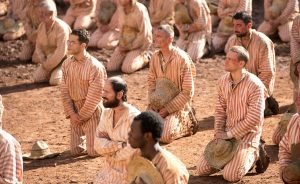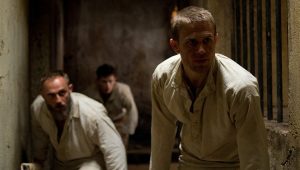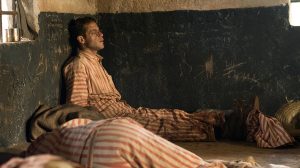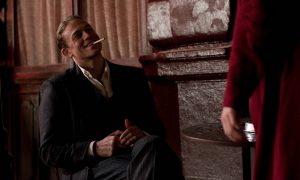![]() The original 1973 feature Papillon is a hard act to follow. The Steve McQueen/Dustin Hoffman prison drama faithfully recreated the horrific conditions of prison in French Guiana during the 30s and the tireless efforts of the title character to escape its confines. This was a dark and brutal movie that still managed to connect with audiences, becoming a sizable hit and earning an Oscar nomination for its score. Some 45 years after the original, a remake of Papillon has arrived. This effort fares better than many reinterpretations of classic films, even if it can’t quite match its predecessor.
The original 1973 feature Papillon is a hard act to follow. The Steve McQueen/Dustin Hoffman prison drama faithfully recreated the horrific conditions of prison in French Guiana during the 30s and the tireless efforts of the title character to escape its confines. This was a dark and brutal movie that still managed to connect with audiences, becoming a sizable hit and earning an Oscar nomination for its score. Some 45 years after the original, a remake of Papillon has arrived. This effort fares better than many reinterpretations of classic films, even if it can’t quite match its predecessor.
 Henri ‘Papillon’ Charriere (Charlie Hunnam) is a safecracker who is arrested for murder and sent to the French territory in South America. He and others are told in no uncertain terms that they have been exiled by their home country and will never return. They are forced to complete their lengthy sentence and then live out the remainder of their lives working as unpaid labor in the colony. While heading out, he encounters nebbish counterfeiter Louis Dega (Rami Malek). Papillon makes a deal with Dega to protect the convict from other thugs, as long as he helps bankroll an escape plan with funds stashed away on his body. The pair face years of unbelievable hardships in a penitentiary designed and operated to break them, both physically and mentally.
Henri ‘Papillon’ Charriere (Charlie Hunnam) is a safecracker who is arrested for murder and sent to the French territory in South America. He and others are told in no uncertain terms that they have been exiled by their home country and will never return. They are forced to complete their lengthy sentence and then live out the remainder of their lives working as unpaid labor in the colony. While heading out, he encounters nebbish counterfeiter Louis Dega (Rami Malek). Papillon makes a deal with Dega to protect the convict from other thugs, as long as he helps bankroll an escape plan with funds stashed away on his body. The pair face years of unbelievable hardships in a penitentiary designed and operated to break them, both physically and mentally.
 It’s a remarkable tale about perhaps the worst correctional facility to ever exist. Real records suggest that during its operation, the death rate of prisoners reached as high as 75% during several years due to extreme labor, lack of food, diseases and mistreatment. This adaptation follows the original fairly closely with a few minor additions and alterations (and as such it is all the more difficult not to make comparisons). The movie takes great pains to show just how awful conditions were, recreating several events, but making them even more graphic. The years spent in the darkness and silence of solitary confinement are perhaps the most unsettling and effective rendered.
It’s a remarkable tale about perhaps the worst correctional facility to ever exist. Real records suggest that during its operation, the death rate of prisoners reached as high as 75% during several years due to extreme labor, lack of food, diseases and mistreatment. This adaptation follows the original fairly closely with a few minor additions and alterations (and as such it is all the more difficult not to make comparisons). The movie takes great pains to show just how awful conditions were, recreating several events, but making them even more graphic. The years spent in the darkness and silence of solitary confinement are perhaps the most unsettling and effective rendered.
 The relationship between Papillon and Dega is well formed and the cast members do well to believably build their relationship over the years. While initially suspicious of each other, the pair’s sense of honor and duty to help one another as they get older does grow and develop into camaraderie. And the toll of the horrific ordeal is effectively rendered. Despite the helplessness and futility of his attempts at escape, Papillon still stands as an ideal of man who will fight to the end and whose desire for freedom will not be broken. He and Dega’s later conversations together on Devil’s Island are affecting on some level, adding some suspense to the finale.
The relationship between Papillon and Dega is well formed and the cast members do well to believably build their relationship over the years. While initially suspicious of each other, the pair’s sense of honor and duty to help one another as they get older does grow and develop into camaraderie. And the toll of the horrific ordeal is effectively rendered. Despite the helplessness and futility of his attempts at escape, Papillon still stands as an ideal of man who will fight to the end and whose desire for freedom will not be broken. He and Dega’s later conversations together on Devil’s Island are affecting on some level, adding some suspense to the finale.
 There are a few additions that aren’t quite as effective. This edition spends the first ten or fifteen minutes with the title character in France. The film really, really wants you to know that Papillon was innocent and was unquestionably framed for murder, whereas beyond a line or two the previous version wisely omitted this material (after all, the prison conditions are so abysmal that it doesn’t take much to sympathize with the inmates). There’s also a coda here set years later that features some unconvincing make-up. The bit isn’t needed and, as with the opening, suggests a strange determination (or fear) to spell things out slowly and clearly for audiences.
There are a few additions that aren’t quite as effective. This edition spends the first ten or fifteen minutes with the title character in France. The film really, really wants you to know that Papillon was innocent and was unquestionably framed for murder, whereas beyond a line or two the previous version wisely omitted this material (after all, the prison conditions are so abysmal that it doesn’t take much to sympathize with the inmates). There’s also a coda here set years later that features some unconvincing make-up. The bit isn’t needed and, as with the opening, suggests a strange determination (or fear) to spell things out slowly and clearly for audiences.
Still, while it doesn’t all work, Papillon is a decent drama detailing an important and disturbing chapter in French history. While those familiar with the 1973 film may recognize that the newer edition doesn’t quite make the same impact as the original, those who are unfamiliar with the material will probably be impressed with the performances and production.


